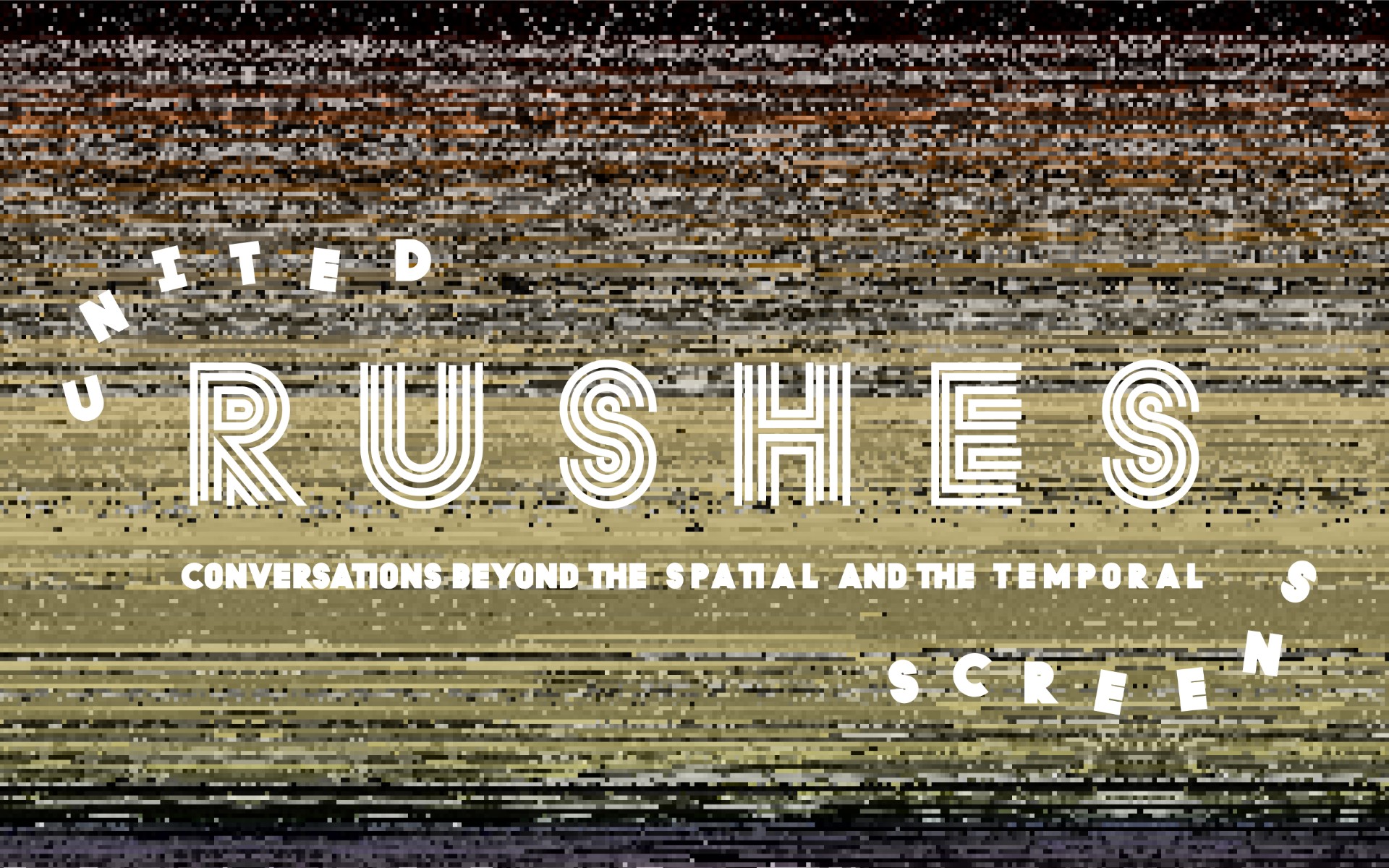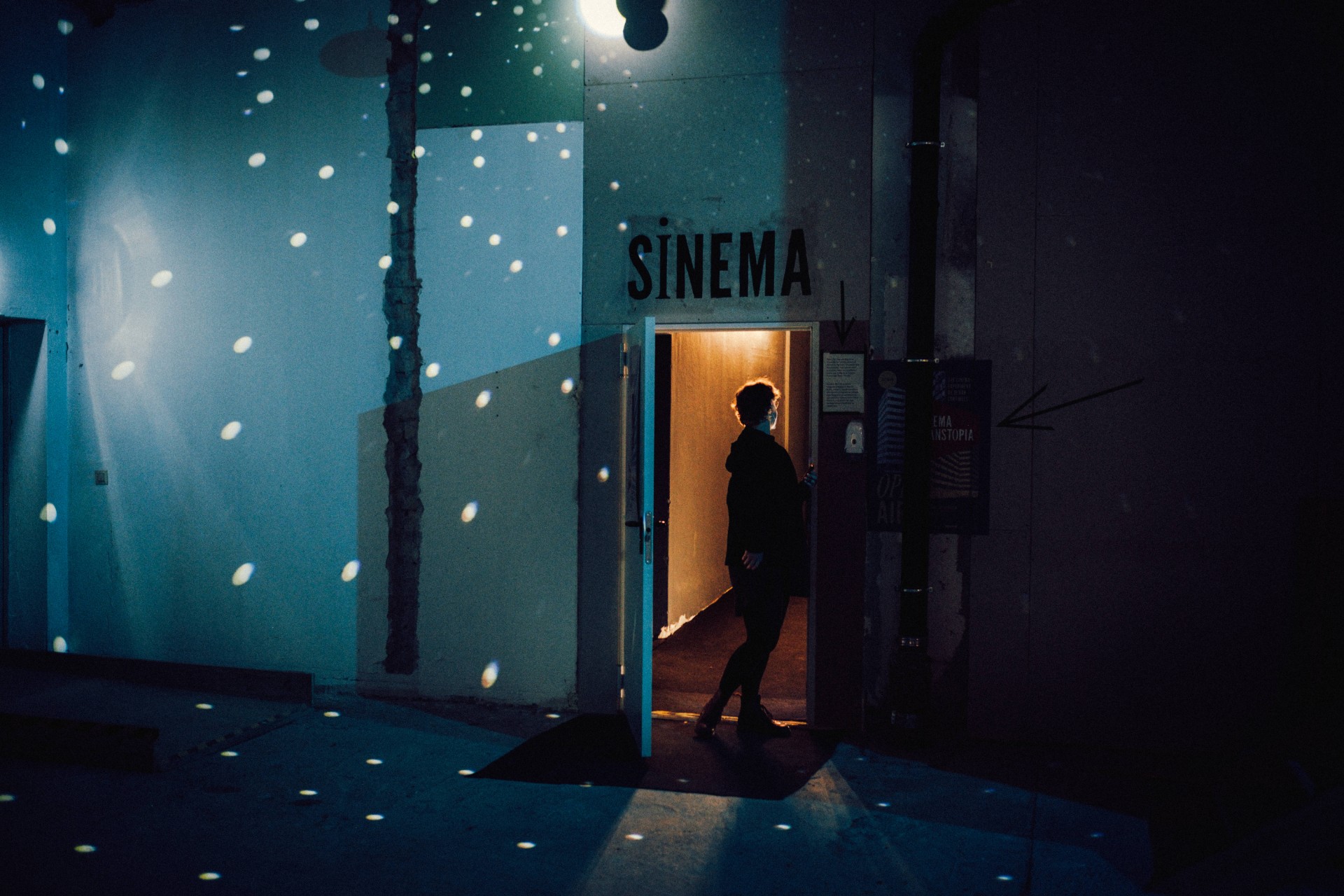United Screens
Think well #2

Exchanges 24.–27.02.2022
At Centre Culturel Neapolis in Nabeul, Tunisia & streamed online
With Ali Hussein Al Adawy, Ihab Amri, Intissar Belaid, Kmar Bendena, Mouna Ben Hamad, Jihed Ben Slimen, Azza Chaabouni, Nadia Cherif, Tahar Chikhaoui, Morgan Corriou, Ala Eddin Slim, Basema El Euchi, Yosra El-Mallah, Mohamed Frini, Mouadh Ghamoudi, Ayman Gharbi, Malek Gnaoui, Luisa González, Sélim Harbi, Rajesh James, Matthieu Kasama, Salma Kossentini, Samia Labidi, Hela Lamine, Insaf Machta, Renée Akitelek Mboya, Habib Mestiri, Khadija Mkacher, Mohamed Najib Mnasser, Manel Souissi, Samhita Sunya, Cedart Tamasala, Jean-Marie Teno, and more
Languages French/Tunsi with English translation and in English with French translation
Participation The event takes place in person as well as online. To join the online meetings, please write us at unitedscreens@savvy-contemporary.com and we will provide you with the link.
Hosted by AVEC – L'Association de Volontariats, Échange Culturel et Action des Jeunes (Tunisia) in partnership with Sentiers (Tunisia) and the United Screens Network
Curated by Manel Ben Ali and Mouhamed Said feat. Insaf Machta, Abhishek Nilamber and Laura Kloeckner
Schedule
[in Arabic below]
Thursday 24.02.2022 | |
In Nabeul | |
18:00 | FILM SCREENING Tlamess By Alaeddin Slim followed by conversation with the filmmaker |
Friday 25.02.2022 | |
In Nabeul & ONLINE | |
10:00 | INTRO With Manel Ben Ali, Mouhamed Said, Abhishek Nilamber, Laura Kloeckner |
10:30 | POST-REVOLUTION CINEMA IN TUNISIA With Mohamed Nejib Mnasser, Intissar Belaid, Khadija Mkacher, Mohamed Frini, Insaf Machta, Mohamed Nejib Mnasser |
12:00 | Lunch |
13:30 | CINÉ CLUBS AS SOIL FOR TUNISIAN CINEMA CULTURE With Morgane Corriou, Kmar Bendena, Tahar Chikhaoui, Habib Mestiri, Insaf Machta |
| 15:00 | Break |
| 15:15 | THE POLITICS OF VIDEO CLUB CULTURe With Jean-Marie Teno, Rajesh James, Manel Souissi, Jihad Ben Sliman, Samhita Sunya, Insaf Machta |
In Nabeul | |
18:00 | FILM SCREENING Sacred Places/Lieux Saints By Jean-Marie Teno followed by a conversation with Ciné Club Nabeul |
Saturday 26.02.2022 | |
In Nabeul | |
| 10:00 | ROUNDTABLE #01 With participants in Nabeul, Tunisia and online via Zoom |
12:00 | LUNCH |
In Nabeul & ONLINE | |
13:30 | NETWORKS, PERFORMATIVITY & CIRCULATION With Luisa González, Renée Akitelek Mboya, Mouadh Ghamoudi, Bassema Eleuchi, Yosra Elmallah |
15:00 | Break |
15:15 | UPDATING CINEMA UX With Intissar Belaid, Cinéryf and workshop participants |
16:00 | VIRTUAL REALITIES – NEW SPACES FOR IMAGINARIES With Hela Lamine, Sélim Harbi, Laura Kloeckner, Manel Ben Ali |
In Nabeul | |
18:00 | FILM SCREENING Short Films Hosted by Cinéryf and Sentiers |
Sunday 27.02.2022 | |
In Nabeul | |
| 10:00 | ROUNDTABLE #02 With participants in Nabeul, Tunisia and online via Zoom |
| 12:00 | LUNCH |
In Nabeul & ONLINE | |
| 13:30 | REMIXING INFRASTRUCTURES AND METHODOLOGIES With Malek Gnaoui, Salma Kossentini, Ayman Gharbi, Cédart Tamasala, Matthieu Kasama, Abhishek Nilamber |
In Nabeul | |
16:00 | FILM SCREENINGS In Thunder, Lightening and Rain by Rajesh James and The White Cube by Renzo Martens |
UNITED SCREENS THINK WELL [1] will manifest its second iteration in February in Tunisia. Over the course of four days, the exchanges will bring together cinema practitioners, researchers and technologists from Tunisia and beyond to rethink questions of film circulation, aesthetics and space in future imaginaries powered by the perspective of the youth. Embracing a hybrid format, we depart from the experiences of the Tunisian cinephilia networks in the 1960s and 1970s and their vast Cine Club and Amateur Film Society circulation cultures to the spirit of post-2011 film production and dissemination technologies. Many of us believe in strengthening collectivities with radical use of technology such that collectivities shape the technologies that they work with and in turn technologies strengthen collective practices.
Our host this time is L'Association de Volontariats, Echange Culturel et action des jeunes (AVEC) – a cultural non-governmental organisation that is leading the project as a youth organization that is interested in creating South-to-South collaboration between Tunisian youth through culture. Primarily having worked on the cultural exchanges between youth in mediterrianian, now AVEC is looking to expand their outreach to youths through cinema.
About this edition
Cinema screening is a moment of magical transcendence. Stories spill over the two-dimensional screen, igniting socio-political imaginaries – it’s the moment when moving images translate into physical action. To use the words of Cameroonian filmmaker Jean-Pierre Bekolo, it is the moment of “applied fiction”. The performativity of cinema and its potential to agitate political movement have made it a formidable force. Repressive regimes and monopoly market interests of colonial distributors have historically held a tight fist on the circulation of imaginaries, creating an ecosystem that is hegemonic and centralised in nature. Little do we need to say about the fact that despite technological and digital innovation not much has changed. Exit strategies to this deceiving situation have been dreamt of by every generation. Tahar Cheriaa, Tunisia’s most prominent cinephil and founder of the Journées Cinématographiques de Carthage (JCC), together with Ousman Sembène and fellow members of the FESPACI as early as the 1960s designed pan-African strategies to liberate Arab and Africa film. “The only reasonable solutions that come to mind are […] collective actions by founding big distribution companies on a regional basis across the continent that will permit a complete and positive change in the monopoly market” (Cheriaa) [2]. The inauguration of the Inter-African Consortium of Cinematic Distribution (ICCD) was a short-lived endeavour and shut down in the early 1980s. Sembène’s vision of a continental net of film festivals spanning nodes between Tunis, Ouagadougou, Cape Town and Mogadishu has materialised in the persistence of FESPACO and the JCC to this day.
While pan-continental solutions were dire to manifest, local forms of subversion sprouted – especially in Tunisia. Cheriaa was part of the first Cine Club ‘Louis Lumière’ in Sfax and the first president of the Tunisian Federation of Cine Clubs (FTCC), a network of self-organised cinephil spaces, which have undoubtedly shaped the uniqueness of Tunisian film culture of the past decades. In tandem with the FTCA, the Tunisian Federation of Amateur Filmmakers, the endeavours and challenges taken on between the 1960s and 1980s actively sought to forge new, strategic, collectives that were bound by multidimensional visions of decolonization – of reclaiming economic, political, and cultural power over the image.[3] Similarly in Cameroon, India and other parts of the South, film society movements and video clubs cultivated sacred places (Jean-Marie Teno), transforming the public sphere for cinephilia. Community-led forms of performativity and sublime dissemination have marked the creative way of activating the community around the love for film. Do these spaces still exist? What role does cinephilia play in contemporary political transformation?
The unique institutionalisation of amateur film culture naturally demands to question the lines between the spectator and the creator, radically raising the question of how to define “cinema”. How does the new generation experience cinema? The Tunisian revolution in 2011 opened a new frontier in the question of space. Much has been written and discussed about the role of cyber networks and virtual spaces for the circulation and organisation of revolutionary images during the 2011 uprising. The undercurrents of the Tunisian revolution, however, can be traced back to the resistances against censorship of the internet as early on as 1998, with the formation of the cyber think tank and resistance network Takriz (The Anger) which inspired future cyberactivists to be bearers of the political transformation to follow. The methods by which many creative dissidences coalesced both online and offline to provide the necessary spiritual energy to shape collective aspirations into a formidable force that dislodges the status quo inspire young generations to come. Tunisian cyber activists, media creators and bloggers who helped echo the agitations on the ground whether it was Redeyef (2008) or Sidi Bouzid (2010), essentially moulded the internet as a space for people’s voices where none existed in the physical domain. This moulding of emerging technologies towards netting collectivity, inspires in our aim to reimagine South-to-South cinema and video art circulation.
“Whoever controls distribution controls cinema.”
2011 undoubtedly unleashed new forces of cinematic expression and a new esprit in the cinematic and audiovisual culture across Tunisia. Collectivity has defined an important modus operandi both for film production as well as its circulations. New screening initiatives and spaces have populated the scenery decentralising their practice by organising in networks or fusing architectural design with film appreciation in the countryside. While new virtual channels for film circulation have delivered success without a doubt, collectivity and conviviality in physical spaces continue to stand their ground to redefine the experience of “cinema”. How can we learn from video club culture to reimagine film circulation across the South? What does the next generation of cinephiles dream of? And what role can we assign to “technology” in the development and sustenance of such systems? And of course, in the spirit of the revolution we are bound to raise questions of labour and livelihoods of cultural practitioners and reflect on the economic frameworks through which culture and specifically cinema circulation is funded, do we need to rethink value systems?
UNITED SCREENS network is putting together a hybrid space for cinema practitioners and technologists from and of the South to sketch the shape of alternative cinema and video art circulation ecosystem(s) for, of and by the South. Hosted by L'Association de Volontariats, Échange Culturel et Action des Jeunes (AVEC) in Nabeul, Tunisia, and curated in collaboration with Sentiers and the United Screens network THINK WELL #02 will bring together cinema practitioners, researchers and technologists to engage with questions of film circulation, aesthetics and space in future imaginaries powered by the perspective of youth. Over the course of these four days, we aim to collectively jam around designs, case studies, methodologies, tools and resources towards an interdependent cinema and video art circulation ecosystem that is yet to be.
For the love of film!
الخميس 24 . 02. 2022 بنابل
18.00 عرض فيلم طلامس لعلاء الدين سليم يليه نقاش مع المخرج بفضاء جيلان للفنون
:: الجمعة 25. 02. 2022 بث من المركب الثقافي نيابوليس نابل ، تونس
بنابل و أونلاين
10.00 -10.30 مقدمة مع منال بن علي، محمد سعيد، أبهشيك نيلمبر، لورا كلوشنار
10.30 - 12.00 سينما مابعد الثورة في تونس مع إنتصار بلعيد، خديجة مكشر، محمد فريني، إنصاف مشطة ، محمد نجيب منصر
12.00- 13.30 غداء
13.30- 15.00 نوادي السينما كأرضية لثقافة السينما التونسية مع مورغان كوريو، قمر بن دانة، طاهرشيخاوي، حبيب المستيري، إنصاف مشطة
15.00- 15.15 إستراحة
15.15 - 17.15 سياسات ثقافة نادي الفيديو مع جون ماري ، راجش جايمس ، منال سويسي ، جهاد بن سليمان، سمهيتا صونيا، إنصاف مشطة
بنابل بفضاء جيلان للفنون
18.00 عرض فيلم ’Sacred Places/Lieux Saints’ لجون ماري تينو يليه نقاش مع نادي السينما بنابل
السبت 26 . 02. 2022 بث من المركب الثقافي نيابوليس نابل، تونس
بنابل
10.00 - 12.00 حلقة نقاش مع المشاركين بنابل، تونس واونلاين
13:30-12:00 غداء
بنابل و أونلاين
15:00-13:30 الشبكات، الأداء و التداول مع لويزا غونزالس ، رنيه مبويا ، معاذ قمودي، بسمة العشي، يسرا الملاح
15:15-15:15 إستراحة
16:00-15:15 تحديث UX السينما مع إنتصار بلعيد، Cineryf و المشاركين/ات في الورشة
17:30-16:00 الواقع الإفتراضي : مساحات جديدة للخيال مع هالة لمين، سليم حربي ، لورا كلوشنيرة، منال بن علي
بنابل
18.00 عرض أفلام قصيرة من إنتاج cinéryf و مسارب بفضاء جيلان للفنون
الأحد 27. 02 . 2022 بث من المركب الثقافي نيابوليس نابل ، تونس
بنابل
10.00 12.00 حلقة نقاش #02 مع المشاركين/ات بنابل، تونس وأونلاين
13:00-12:30 غداء
بنابل و أونلاين
13.30 - 15.00 إعادة دمج البنى التحتية و المنهجيات / رميكسنغ البنى التحتية و
المنهجيات مع مالك قناوي ، سلمي قسنطيني ، أيمن الغربي ، رنزو مارتينيز ، سيدار
تماسالة ،ماثيو كاساما ، أبهيشاك نيلمبر
بفضاء جيلان للفنون بنابل
16.00 - 18.30 عرض أفلام 'In Thunder Lightning and Rain' لراجش جايمس و
UNITED SCREENS is a long term research, networking and exhibition project, conceived at SAVVY Contemporary, Berlin, that intends to create a platform through which a network of community cinema programmers can be enabled to screen quality alternative cinema and video art. These films would be hosted on a de-centrally curated database of alternative cinema/video art. We are working towards a new technology-based platform to distribute independent films produced across the Global South, comprising of African and Asian continents at large, Latin America, Eastern Europe and Indian subcontinent.
Drawing from the combined spirit of the anti-neocolonial Third Cinema proposition of South America, film cooperatives of Indian subcontinent, avant-garde movements of Eastern Europe, as well as, decolonial resistances of the African continent, we at SAVVY Contemporary were inspired to look into cinema practices active in the contemporary “Global South”, and inquire into the challenges and opportunities in their transnational exhibition.
UNITED SCREENS aspires to become a decentralised, yet peer-reviewed and peer-promoted think-tank on film cultures from the Global South.
ARTISTIC DIRECTION Bonaventure Soh Bejeng Ndikung
PRODUCTION Rachid Jannen, Mouhamed Said, Ranav Adhikari, Nancy Naser Al Deen
MANAGEMENT Lema Sikod, Billy Fowo
DESIGN Nancy Naser Al Deen
COMMUNICATIONs Anna Jäger
TRANSLATION Hiba Tlili and Sarah Lassoued
Live Stream Boiling Head Media
Think wells are organised as part of the SAVVY Contemporary project UNITED SCREENS: NEAR EAST, MIDDLE EAST, FAR EAST. Contemplations on Contemporary Cinema – in collaboration with Wekalet Behna (Egypt), AVEC – L'Association de Volontariats, Échange Culturel et Action des Jeunes (Tunisia), NAAS – Network of Arab Alternative Screens (Lebanon), Estación Terrena (Colombia), and ARKIPEL - Jakarta International Documentary and Experimental Film Festival (Indonesia).
Support This project is generously supported by Arab Funds for Art & Culture (AFAC).

THINK WELL is a vocal resistance coined by South African writer, playwright, filmmaker Puleng Lange-Stewart diverting from etymology which resonates with overtones of crisis and desperation (think tanks). She urges us to move towards a "well" where we can find respite, collectively. Believing that our groundwaters are connected, United Screens THINK WELLS initiates flows between cinema practitioners, filmmakers from the Global South to imagine a new film ecosystem powered by community-led technological imaginaries.
In: Samhita Sunya. “Distributed Histories of Tunisian Amateur Cinema and the Screening of Nontheatrical Film”, Masha Salazkina and Enrique Fibla-Gutierrez (Ed): Global Perspectives on Amateur Film Histories and Cultures, 2020.
Ibid.


